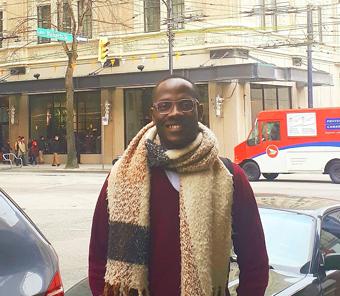|
Elizabeth Henry Scholarship - 2017 & 2018 Fund Recipients > 2018 posted on 2:58 PM, November 13, 2019
“I am indeed grateful for, and highly motivated by the support of, the Elizabeth Henry Scholarship of a project that seeks to empower marginalized individuals who work assiduously in promoting environmental sustainability through waste recovery” — Dare Sholanke Congratulations to Dare Sholanke, recipient of the 2018 Elizabeth Henry Scholarship About Dare Dare is a Masters student in the Department of Geography, University of Victoria, British Columbia. He earned his Bachelor of Science in Environment Management and Toxicology at Federal University of Agriculture, Abeokuta, Nigeria in 2015. During his undergraduate program, he had an internship at the Lagos State Environmental Protection Agency (LASEPA) where he worked concurrently with the pollution control department and the laboratory services department. After graduation, he worked for a year at the Niger State Environmental Protection Agency as an Environmental Officer. His passion for community and environmental health and sustainability was born out of his experiences working with these Environmental Protection Agencies in a developing nation. His current research under the supervision of Dr. Jutta Gutberlet seeks to map waste governance in relation to the informal recycling sector, with the aim of empowering marginalized individuals who contribute immensely to environmental sustainability through waste recovery. About this Project on the Informal Recycling Sector As waste generation continues to increase globally, its management has become problematic. Through waste recovery, the informal recycling sector has contributed significantly to reducing landfill jam and carbon footprints. However, individuals in this sector are generally marginalized, impoverished, and are mostly excluded from the formal waste management system — and Canada is not an exception. Using a comparative case study approach and mixed method, this study examines waste governance in two Canadian cities with the aim of identifying how through policymaking, political actors affect waste recovery and the level of inclusiveness in the waste management system. The study will investigate the role of grassroots social innovations in improving the livelihoods of these individuals. Results from this research will help inform authorities, policy makers and practitioners on the need for an inclusive waste management system and will provide strategies for improving the livelihoods of this sector while promoting sustainability in the city. |
||
- About Us
- Programs & Services
- Climate Change & Air Quality
- Watersheds & Water Resources
- Sustainable and Resilient Communities
- Our Work in the Regions
- Resources
- News and Events


